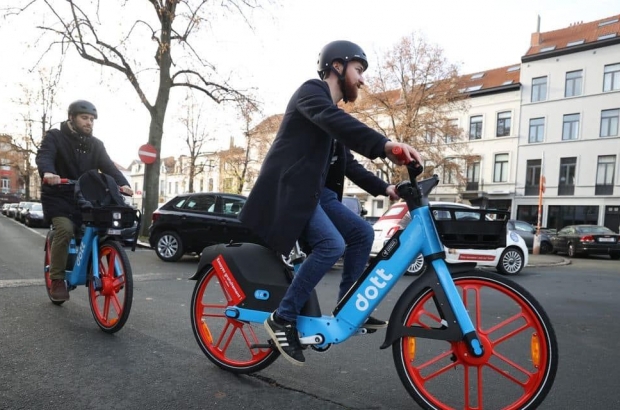- Daily & Weekly newsletters
- Buy & download The Bulletin
- Comment on our articles
Etterbeek to tax shared bike and scooter firms
Etterbeek municipal council has approved a new tax regulation targeting operators of shared bicycles, scooters and mopeds.
The measure will come into force on 1 January 2026 and aims to offset the costs incurred by the municipality for the management of public space and mobility, said municipal councillor in charge of finance, Rachid Madrane (PS).
The tax will apply to any company operating a micromobility sharing service accessible in the Etterbeek area, even if its headquarters are located elsewhere.
Each operator will pay a flat fee of €1,000, plus €20 per vehicle deployed and €30 per 1,000 journeys starting or ending in the municipality. This tax will be calculated on an annual basis and collected in two instalments, with amounts to be slightly indexed each year until 2030.
A 50% reduction is planned for approved cooperatives or non-profit associations pursuing a social or environmental objective.
“As a municipality, it is our responsibility to ensure a balanced budget,” said Madrane.
“We’re introducing this tax because the operation of shared scooters and bicycles burdens the municipality with additional costs for the management of public space. We want the operators to contribute to a fair and proportional tax system.”
Taxpayers will be required to submit two declarations per year detailing the number of vehicles in service and the volume of journeys. Checks will be carried out and, in the event of non-declaration, an automatic tax assessment with a surcharge will be applied.
The municipality hopes the tax will generate more than €100,000 annually.
The council emphasised that the tax is not intended to regulate mobility provision but to cover local costs related to parking, safety and urban sanitation, noting that it remains separate from the regional licences imposed on operators.
The regulation must now be approved by the regional supervisory authority, but has already drawn the ire of the companies that would be affected.
Voi, which manages 2,500 shared bicycles in the Brussels region, said that it already paid more than €90,000 in taxes to the region each year.
“Operators already pay a tax of €50 per scooter and €35 per bicycle to the region, amounts that have since been indexed,” said Voi spokesperson Yessin Aattach.
“Some 80% of those revenues flow back to the municipalities, including Etterbeek, so this is double taxation.”
Voi hopes that further consultation is still possible, saying that, otherwise, users will have to foot the bill.
“If this measure is implemented, we will inevitably be forced to increase prices in Etterbeek,” said Aattach.
“In concrete terms, this means that Etterbeek residents will pay more for a ride. This threatens to make shared mobility less accessible, precisely for those residents who benefit most from a cheap alternative to the car or private bicycle.”
Scooter provider Bolt also criticised the idea of paying more taxes.
“Shared mobility is a huge success in Brussels – last summer, we saw days when shared mobility accounted for 100,000 rides in a single day,” said Marc Naether of Bolt Benelux.
“Local initiatives that deviate from regional policy will jeopardise this success and ultimately lead to higher prices. We question the legality of this tax and call on the region to cancel it.”
Madrane rejected the claim that the tax was illegal, saying the fiscal autonomy of the municipalities is enshrined in the constitution.
“The region is responsible for the licences, but what we are doing is taxing the operation, and that’s not within the region’s competence,” said Madrane.
“When you register a car, you pay taxes to the region. But we, as a municipality, tax the use of parking spaces. The new tax on shared mobility fits into the same logic. We'll see what the region says, but I don't see any reason why a municipality shouldn't be allowed to do this.”


















